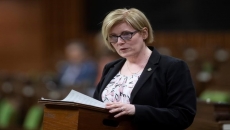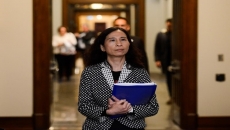Provinces have been releasing plans for easing restrictions that were put in place to limit the spread of COVID-19.
Here is what some of the provinces have announced so far:
Newfoundland and Labrador
Newfoundland and Labrador lifted some of the public health restrictions imposed to slow the spread of COVID-19 on Monday. The province is entering "alert level four" in its five-level reopening plan, allowing some businesses such as law firms and other professional services to reopen along with regulated child-care centres, with some restrictions. Small gatherings for funerals, burials and weddings are also permitted with a limit of 10 people following physical distancing rules. Municipal parks, golf courses and driving ranges can open and recreational hunting and fishing are permitted. Officials are reminding people that the new rules do not allow for parties or other social gatherings.
The province is loosening restrictions in a series of "alert levels" descending from five. The current alert level is to remain in place for at least 28 days. At Level 3, private health clinics, such as optometrists and dentists, are to be permitted to open, as well as medium-risk businesses such as clothing stores and hair salons. At Level 2, some small gatherings will be allowed, and businesses with performance spaces and gyms are to reopen. Level 1 would represent "the new normal."
---
Nova Scotia
Nova Scotia Premier Stephen McNeil announced on Friday that there will be no return to school this year. He also said a decision on whether daycares will reopen will be made by June 8. Nova Scotia has eased some public health restrictions, however, directives around physical distancing and social gatherings remain in place. Trails and provincial and municipal parks can now reopen, but playground equipment will continue to be off limits. Garden centres, nurseries and similar businesses can open, and while golf driving ranges can open, courses will remain closed. Sportfishing is permitted and people can attend boating, yacht or sailing clubs for the purpose of preparing boats for use. Drive-in religious services will be allowed, as long as people stay in their cars, they are parked two metres apart and there are no interactions between people.
---
Prince Edward Island
Members of a household can now gather indoors with up to five other people. Other precautions, such as physical distancing remain in place. Screening also continues at points of entry into the province and all people coming into P.E.I. are required to isolate for 14 days. Priority non-urgent surgeries and select health-service providers, including physiotherapists, optometrists and chiropractors, resumed on May 1 under The Renew P.E.I. Together plan. The plan also allows outdoor gatherings and non-contact outdoor recreational activities of no more than five individuals from different households.
---
New Brunswick
New Brunswick is allowing more businesses and services to open as it launches the second phase of its COVID-19 recovery plan. Daycares, retail businesses, offices, restaurants, libraries, museums, seasonal campgrounds and ATV trails can reopen immediately under certain conditions. Those include having an operational plan that explains how they are meeting public health guidelines including physical distancing, hand hygiene and allowing staff to remain home when ill. Two-household "bubbles" remain in place, but now outdoor gatherings of up to 10 people are also allowed if physical distancing is respected. The resumption of elective surgeries is also part of phase two. The third phase will allow regular church services, dentistry work and reopened fitness centres. The final phase, which will probably come only after a vaccine is available, will include large gatherings. Phase one, which started on April 24 allowed limited play on golf courses as well as fishing and hunting. Post-secondary students were allowed to return if it was deemed safe by the school, and outdoor church services were again permitted, providing people remain in their vehicles and are two metres apart.
---
Quebec
Quebec reopened retail stores outside Montreal on Monday while those in the greater Montreal region are to reopen May 25. For the second time, the province pushed back the reopening of retail stores in the greater Montreal area by another week. Premier Francois Legault said the province will keep close tabs on the situation in the city before deciding whether stores, daycares and elementary schools can reopen later this month. Elsewhere in Quebebc, lottery terminals have begun to reopen after being shut down on March 20 with sales moving to online only. Schools and daycares outside Montreal reopened on Monday, but schools, junior colleges and universities are to stay closed until September. Quebec's construction industry also reopened on Monday. Manufacturing resumed operations on Monday with limits on the total number of employees who can work per shift.
---
Ontario
The province announced May 6 that it was allowing non-essential retail stores to open for curbside pickup. Garden centres and nurseries were allowed to reopen Friday, while hardware stores and safety supply stores were allowed to reopen Monday. Premier Doug Ford says those stores will be expected to follow the same public health measures as grocery stores and pharmacies now do, such as physical distancing, offering contactless payment and sanitizing surfaces. Ontario is expected to extend its COVID-19 state of emergency to June 2. The state of emergency is dealt with separately from the emergency orders, recently extended to May 19, which cover closures of bars and restaurants except for take-out and delivery, theatres, outdoor amenities such as playgrounds, and child care centres. Ontario has previously announced that publicly funded schools will be closed until at least May 31, and Ford said that news on child care centres and schools is coming early next week.
---
Saskatchewan
The Saskatchewan government's five-phase plan to reopen parts of its economy started Monday with dentists, optometrists and other health professionals being allowed to resume services. Phase 1 also includes reopened golf courses and campgrounds. Phase 2 will give the green light to retail businesses and salons. Restaurants and gyms could open in Phase 3, but with limited capacity. Phase 4 could see arenas, swimming pools and playgrounds opening. In Phase 5, the province would consider lifting restrictions on the size of public gatherings.
---
Manitoba
The Manitoba government is lifting its one-month limit on people's prescription drug supplies. As of Monday, people will be able to get prescriptions filled or refilled for 90 days, which was the previous limit. Last Monday Manitoba allowed health offices, including dentists, chiropractors and physiotherapists to reopen. Retail businesses were allowed to reopen at half occupancy as long as they ensure physical spacing. Restaurants could reopen patios and walk-up service. Museums and libraries also reopened, but with occupancy limited to 50 per cent. Playgrounds, golf courses and tennis courts reopened as well, along with parks and campgrounds. A second phase is to begin no earlier than June 1. That's when restaurants would be allowed to open indoor dining areas and non-contact children's sports would resume. Mass gatherings such as concerts and major sporting events will not be considered before September.
---
Alberta
Alberta plans allowed some scheduled, non-urgent surgeries to start Monday. Service provided by dentists, physiotherapists and other medical professionals are also to be permitted. Golf courses reopened May 2, though pro shops and clubhouses remain shuttered. On May 14, retail businesses, such as clothing, furniture and bookstores, are to be allowed to reopen gradually. Cafes and restaurants with no bar service will also be allowed to run at half capacity. The second phase also includes potential kindergarten to Grade 12 classes — with restrictions — and the reopening of movie theatres and theatres, again, with restrictions. The third phase would see nightclubs, gyms, pools, recreation centres and arenas reopen, all with restrictions. There is no timeline for the final two phases.
---
British Columbia
The provincial government is allowing a partial reopening of the B.C. economy starting May 19, the day after the Victoria Day holiday. All of the government's reopening plans are contingent on organizations and businesses developing plans that follow provincial guidelines to control the spread of COVID-19. Hotels, resorts and parks will follow in June. A mix of online and classroom post-secondary education is planned for September, along with classes returning for students in kindergarten to Grade 12. Conventions, large concerts, international tourism and professional sports with a live audience will not be allowed to resume until either a vaccine is widely available, community immunity has been reached, or effective treatment can be provided for the disease.
---




.jpg)
